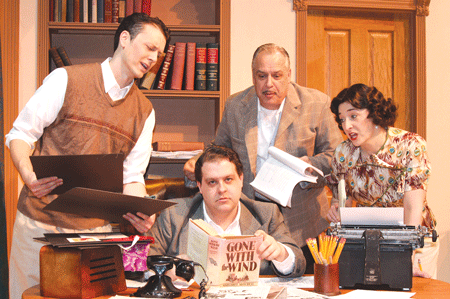The making of the film version of Gone with the Wind is explored in a play filled with Jewish sensibilities
By DORIS RUBENSTEIN
Star Trek is often referred to as the first science fiction television show that was “Jewish,” since its stars, William Shatner (Captain Kirk), Leonard Nimoy (Mr. Spock) and Walter Koenig (Lt. Chekhov), were all Jews. If this is true, then can the same be said of the film version of Gone with the Wind, which was produced by David O. Selznick, starred Leslie Howard (Steiner) and was written in no small part by Ben Hecht?
Playwright Ron Hutchinson leaves no doubt about the Jewish sensibilities of the milestone American film in Moonlight and Magnolias, which is currently playing on the Bloomington Civic Theatre’s Black Box stage.
Moonlight and Magnolias, based on what actually happened during the film development of Gone with the Wind, invites — or kidnaps? — the audience to participate in a marathon rewrite of Sidney Howard’s original screenplay of Margaret Mitchell’s epic novel. For five days, Selznick (Bryan Grosso, who bears an uncanny physical resemblance to the storied producer) and director Victor Fleming (Paul Rutledge) are (voluntarily?) sequestered in Selznick’s office with “Script Doctor” Ben Hecht (David F. Dubin).
Their only sustenance is bananas and peanuts, supplied with eye-rolling patience by Selznick’s long-suffering secretary Miss Poppenghul (Kara Gershwalk). What results is a combination of creativity, philosophy and mayhem.

Sparking the play’s story is the fact that Hecht had not read the book at the time he entered Selznick’s office to reshape the screenplay, already attempted by nearly a dozen seasoned writers. This obliges Selznick and Fleming to act out the story so that Hecht can put flesh on the script’s bones.
It also gives the playwright the openings he needs to provide illuminating dialogue on a variety of subjects — from the personalities of the movie’s stars and the history of Hollywood, to 20th-century race relations and the rise of Nazi anti-Semitism.
Despite the serious nature of these subjects, Moonlight and Magnolias is likely to be categorized as a comedy. Hecht, a respected Chicago news reporter earlier in his career and an in-demand screenwriter during the time of this play’s action, has a sharp sense of humor and irony, which he uses to prod his fellow “inmates” into some major intellectual and physical acrobatics.
As Minnesotans, we are all familiar with the stress of cabin fever; here, the actors release their tensions after three days of seclusion with a wild and liberating free-for-all worthy of the Marx Brothers or Three Stooges. Special recognition must go to Robin McIntyre for the set design; it must hold up to some pretty tough treatment throughout the action.
The fast pace of the play reinforces the sense of urgency that the real participants of the story felt. Selznick knows that his future professional career hangs on the success of Gone with the Wwind; his ego, also, is at stake as he dodges phone calls from his (also Jewish) father-in-law, Louis B. Mayer, who is waiting for Selznick to fail in the project.
Jewish identity is discussed more than once during the course of the play. Hecht accuses Selznick of being an assimilationist. Selznick does not deny this and explains that his heritage is the movies, not the Old World culture of his grandparents.
“We’re Americans now!” he exclaims.
This is not altogether untrue in his case, as he was virtually raised on a movie lot. Still, he cannot escape the anti-Semitism that was still alive among Hollywood’s elite in the 1930s in their country clubs, etc. Who knew that the developer of Beverly Hills built the community because Jews were restricted by covenants from living in other upscale enclaves?
Hecht was an ardent Zionist as well and reminds Selznick and Fleming of the many creative talents working in Hollywood at that time who were fleeing the Nazis. (Hecht’s activism continued throughout the early years of the Jewish state, earning him a spot on England’s “black list” and a boat named in his honor by the Israelis.)
The audience must pay close attention to catch all of the Hollywood names dropped and to make all of the connections in a somewhat incestuous community in the context of its time in American and world history. It is here that Moonlight and Magnolias may prove difficult or confusing to younger members of the audience.
The playwright assumes that the audience is familiar with the film. But, like Hecht, my younger companion at the Black Box had never seen or read Gone with the Wind. For example, she found Selznick’s interpretation of Prissy in the famous “I don’t know nothin’ ’bout birthin’ babies” scene somewhat laughable, but it was not until the post-performance discussion that she fully realized the racism inherent in it.
How many in the audience in her position will know that the black members of the cast, including Oscar-winner Hattie McDaniel, were not invited to the film’s premiere in a whites-only theater in Atlanta?
The Bloomington Civic Theater has a well-deserved reputation for excellence in its class. This production of Moonlight and Magnolias only serves to continue and enhance that reputation and is worthy of strong support from AJW readers.
***
Moonlight and Magnolias by Ron Hutchinson is playing through March 24 in the Black Box Theater at the Bloomington Civic Theatre, 1800 W. Old Shakopee Rd. For tickets and information, call 952-563-8575 or visit: www.btacmn.org.
(American Jewish World, 3.15.13)



















